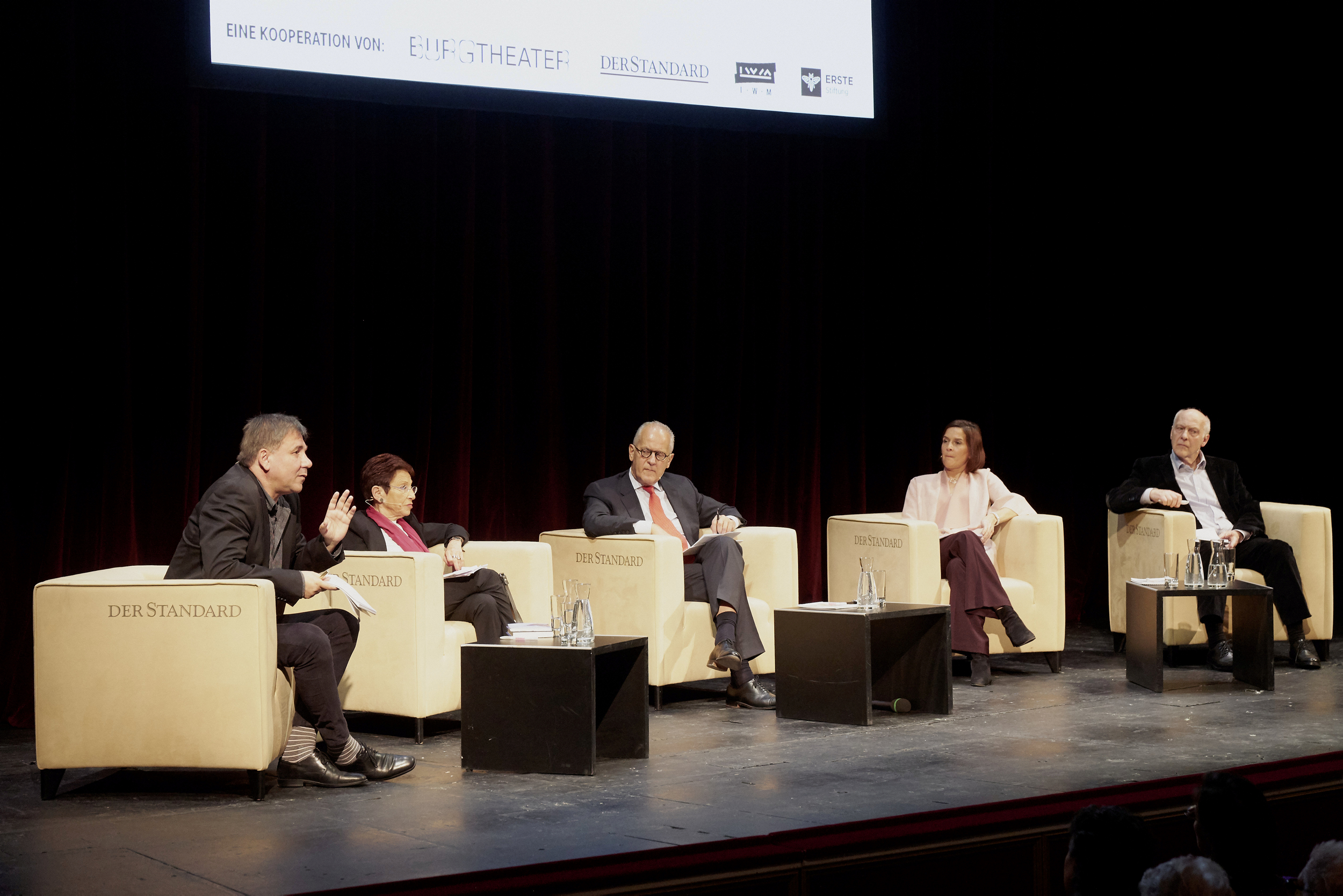How should we deal with nationalism, isolationist tendencies and global challenges? Top-class speakers discussed this topic at Debating Europe in Vienna’s Burgtheater.
What unites Europeans, what divides them, and where is this continent heading in these times of resurgent nationalism? These questions were the starting point of a discussion in the Debating Europe series of talks in the Burgtheater on 10 November 2019. The discussion was organized by the IWM Institute for Human Sciences and ERSTE Foundation in cooperation with Der Standard and the Burgtheater. Their guest speakers were united in their opinion that Europe is the sum of its people, viewpoints and historical experiences.

“Debating Europe” at the Burgtheater: “European Nation vs. Europe of Nations?” with Ivan Krastev, Ruth Wodak, Ivan Vejvoda, Constanze Itzel, Jacques Rupnik. Photo: © Robert Newald / DER STANDARD
The discussion could not have been better timed. Two events that are central to Europe’s identity are currently at the forefront of people’s minds: the November 1938 pogroms that ushered in one of European history’s darkest chapters, and the fall of the Berlin wall and the collapse of communism in 1989, when the whole of Europe was swept up in the mood of elation and the idea of European unity.
1989
However, the idea of openness was not the only element in the victory over communism in 1989, as Ivan Krastev, political scientist and IWM permanent fellow, emphasized; nationalism also played an important role. Later, he claimed, the dominant narrative was that 1989 had produced a united Europe; nationalist sentiments were only present beneath the surface during the nineties. Linguist Ruth Wodak contradicted this, pointing to the Waldheim affair and the rise of right-wing populist Jörg Haider in Austria.
Constance Itzel, director of the House of European History in Brussels, explained that even today, European history is seen through “national glasses”. In this context, the nation state is often presented in opposition to Europe – a differentiation that right-wing populist parties continue to instrumentalize politically with considerable success. Nostalgia and the longing for the “good old days” play a key role in times of increasing uncertainty. In Itzel’s analysis, the feeling of having to preserve something in order not to lose what has been gained is currently very strong in Europe.
The refugee crisis: a turning point
In the speakers’ opinion, the origin of this feeling could be pinpointed in 2015, the year of what is often referred to as the refugee crisis in Europe. For Ruth Wodak, this was a key turning point. “New walls were built; the concept of Fortress Europe was more present than ever before.” Four years ago, this development made it clear that nation states are strongly defined by religion. Wodak pointed out that Eastern European countries such as Poland have gladly welcomed migrants from Ukraine, but rejected the immigration of Muslims.
Jacques Rupnik, a French political scientist and historian, emphasized that it is not only the people who must accept the signs of changing geopolitical times: politicians must also come to terms with them. “If the trans-Atlantic relationship no longer functions, we must take care of Europe’s security ourselves. Anyone who sets national interests against European ones has not understood the situation,” said Rupnik.
Both Rupnik and Itzel also emphasized the importance of positive visions for Europe in both East and West, stating that the European project’s success in producing unique factors such as stability, democracy and freedom cannot be mentioned too often. As Rupnik put it, the greatest feature of the European project is how many different “European dreams” have already been achieved within Europe.
The currently dominant feeling of fear of the future must however be countered with a joint focus on building a social Europe, as Ruth Wodak emphasized. “Transnational solidarity must be possible: otherwise the crisis will not go away.”
Original in German. First published on 10 November 2019 on derStandard.at.
Translation from German to English by Bridget Schäfer.
This text is protected by copyright: © Manuela Honsig-Erlenburg / DER STANDARD. If you are interested in republication, please contact the editorial team.
Copyright information on pictures, graphics and videos are noted directly at the illustrations. Cover picture: Art work of Banksy in Dover. Photo: © Teun Voeten / Reporters / picturedesk.com
Debating Europe
European Nation vs. Europe of Nations?
Sunday, 10 November 2019, 11 h, Burgtheater Vienna
The new season’s first debate looks at the possibilities and limitations of a “European nation” as compared to a “Europe of nations”: What has made the nation a successful model? How should we deal with the resurfacing of nationalism and the drift towards isolation? And which imperial legacies play a role in Eastern and Western Europe’s current search for identity?
Panelists:
Constanze Itzel
Museum Director, House of European History, Bruxelles
Ivan Krastev
Political Scientist and IWM Permanent Fellow
Jacques Rupnik
Political Scientist and Historian
Ruth Wodak
Linguist, Lancaster University and Vienna University
Chair: Ivan Vejvoda
Political Scientist and Head of the Europe’s Futures project
“Debating Europe” is a cooperation of the Institute for Human Sciences (IWM), ERSTE Foundation, Burgtheater and DER STANDARD.
